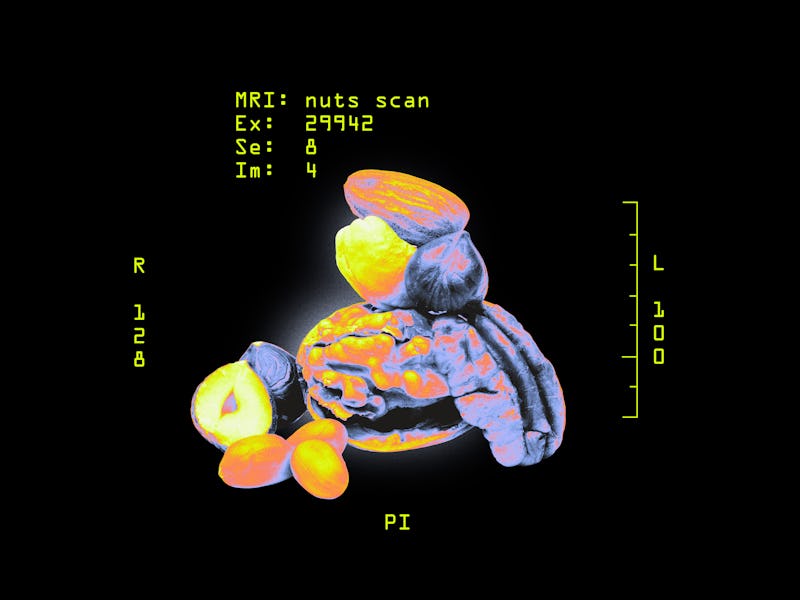Should You Store Nuts in the Freezer? Chemistry Offers a Surprising Answer
A few rancid nuts won’t hurt you.

Bread, apples, and even butter (to a certain degree): These are just a few of the foods that sit at the center of the “refrigerate or leave on the counter” debate. But what about nuts? Do you leave them on the counter, place them in the fridge, or throw them in the freezer?
We all have that extra bag of pecans in the back of the pantry in case we ever want to bake. Surely these fat and protein bombs are safe sitting there long term, right? It turns out, though, that based on how nuts break down over time, there’s one storage method that stands above the rest.
Can nuts go bad?
Yes — not only do they go bad, but they go rancid. This may come as a shock, but nuts only keep fresh at room temperature for about three months. Karen Schaich, a food scientist at Rutgers University, tells Inverse that the compounds that give nuts a stale, oily flavor can be tasted at extremely low levels, as tiny as parts per million or billion.
The problem is many people become accustomed to the flavor, especially while it’s still at low levels. Schaich brought rancid natural peanut butter in for her students as an example. “They smelled it and said, ‘Oh, that smells normal,’” she tells Inverse. Fresh peanut butter, she says, tastes “like cardboard” because it lacks the compounds that give it the oily flavor we may be used to. But when those levels get too high, they develop flavors that taste a little off.
What makes nuts go bad?
There’s an intricate chemistry at play when air interacts with the fat molecules in nuts. Their physical shape influences how quickly they expire. Nuts with a large surface area are prone to rapid rancidity because there are more areas that are exposed to oxygen. For this reason, walnuts go rancid fastest because they have the greatest surface area. The walnut’s brain-like ridges create tons of crevices where oxygen can seep in. Almonds, on the other hand, take longer to go bad because they’re so compact. Their density is greater than their surface area.
On the molecular level, Schaich points to unsaturated fat content as a main factor. As nuts oxidize or interact with the oxygen around them, new compounds are produced. The more unsaturated fats, the more quickly the nut will oxidize. Nuts high in unsaturated fats are chock full of molecules secured with double bonds, meaning the joined atoms share two electron pairs between them rather than just one. Once that double bond oxidizes, it releases particles called free radicals, which are uncharged molecules that can easily bind with anything around it and create a new substance. The free radicals in nuts can make hydroperoxides, aldehydes, and ketones. Hydroperoxides are extremely susceptible to decomposition in heat and light, so they can further speed reactions, while the latter two create that off flavor in stale nuts.
Storage conditions can hasten or slow this process, too. Reactions occur more quickly at higher temperatures, so the fridge or, even better, the freezer grind oxidation to a near-halt, staving off the formation of free radicals in nuts. Light exposure also affects oxidation. Keeping shelled nuts or any other food high in unsaturated fats in direct light will make it go bad faster.
Slowing rancidity is worth considering because once it starts, it won’t stop. “The problem with rancidity is once you start, it's a chain reaction [that] goes and goes and goes,” she tells Inverse.
Is eating rancid nuts harmful?
Eating rancid nuts is nothing like consuming rancid dairy or bad seafood. It’s closer to eating stale potato chips — maybe there’s a bit of an off taste (if that), but they’re not wretch-inducing, nor will they knock you off your feet.
Hydroperoxides and aldehydes are known to contain some toxic compounds, but from the moment you pop a bad nut in your mouth, your body starts producing enzymes that break down the hydroperoxides, aldehydes, and other byproducts of oxidation. Those enzymes follow into your stomach and intestines, where they bubble to life in that acid pH, largely detoxifying those byproducts.
“If somebody was living on rancid peanuts, rancid potato chips, and all snacks, that could be a problem,” Schaich says. “As long as you're eating a healthy diet and not overeating a lot of oxidized foods on a consistent basis, they're not going to hurt you,” Schaich says.
What’s the best way to store nuts?
In a hermetically sealed glass jar in the freezer. Hermetic sealing involves removing all oxygen from inside the jar. Schaich also says that two or three layers of plastic are another effective method.
Keeping nuts in-shell at room temperature is also an option, but only for about six weeks. Schaich says that if you put some whole walnuts out “at Thanksgiving, [they] probably could get to Christmas” before they exhibit those off flavors.
If you have a designated shelf in the cupboard for walnuts, macadamia nuts, almonds, cashews, peanuts, and your other favorites, keeping them there likely won’t do you any harm, assuming you’re eating a balanced diet. But if you’re so inclined to keep your favorite nuts fresh for a long time, consider jarring and storing them in the freezer.